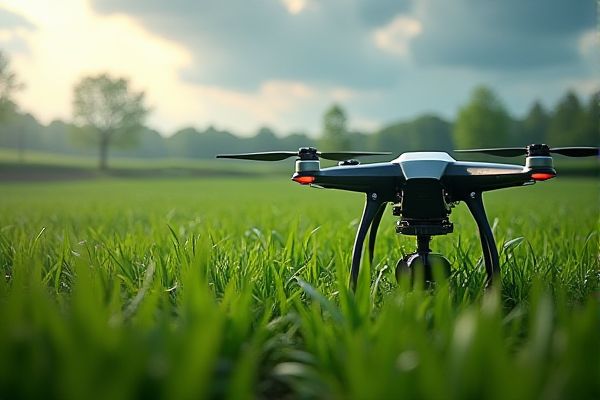
AI enhances precision farming by analyzing soil data and crop health, leading to optimized irrigation and targeted fertilization. Machine learning algorithms predict weather patterns, helping farmers make informed decisions on planting and harvesting. Drones equipped with AI technology monitor crop conditions and detect diseases early, reducing yield loss. Autonomous tractors and robotic harvesters increase efficiency, allowing for reduced labor costs and improved productivity.
AI usage in agriculture technologies
Precision Farming
AI in precision farming has the potential to significantly enhance crop yields by analyzing data from sensors and satellite imagery. Farmers can optimize irrigation and nutrient application, reducing waste and improving resource efficiency. Companies like John Deere are integrating AI-driven technologies to support data-driven decision-making in land management. This approach can lead to a more sustainable agricultural practice, ultimately benefiting both farmers and the environment.
Crop Monitoring
AI usage in agriculture technologies can significantly enhance crop monitoring by enabling real-time data analysis and insights. For instance, precision agriculture tools utilize AI algorithms to assess soil health, moisture levels, and crop conditions, leading to optimized resource allocation. Farmers can potentially increase yield and reduce costs through timely interventions based on predictive analytics. Implementing such technologies, like satellite imagery analysis, offers a promising advantage in managing agricultural production efficiently.
Yield Prediction
AI in agriculture technologies offers significant potential for yield prediction, improving crop management decisions. Machine learning algorithms can analyze historical weather data, soil conditions, and crop health to forecast yields with greater accuracy. For instance, tools developed by institutions like the University of California are helping farmers optimize their planting strategies based on AI-driven insights. This technology not only reduces resource waste but also increases the chances of maximizing harvests.
Pest and Disease Detection
AI technologies offer the potential to enhance pest and disease detection in agriculture, leading to improved crop yields. Machine learning algorithms can analyze data from sources like satellite imagery and soil sensors to identify early signs of infestations or infections. For example, using AI-driven tools like Plantix can allow farmers to quickly diagnose plant health issues. This proactive approach may result in lower pesticide use and higher harvest efficiency, benefiting both the environment and farmers' profits.
Smart Irrigation Systems
The integration of AI in agricultural technologies, such as smart irrigation systems, can optimize water usage and enhance crop yields. By using data from weather forecasts and soil sensors, these systems can adjust irrigation schedules to conserve resources. For instance, a smart irrigation system deployed by a university research institute has demonstrated potential cost savings for farmers. This technological advancement presents a significant opportunity for sustainable agricultural practices and improved efficiency.
Automated Machinery
AI usage in agricultural technologies offers the potential for increased efficiency and productivity through automated machinery. Systems like precision farming can optimize resource use, improving crop yields while minimizing waste. For example, a tractor equipped with AI can analyze soil conditions in real-time, adjusting operations to suit varying field requirements. Implementing these technologies may enhance the sustainability of farming practices, benefiting both farmers and the environment.
Soil Health Analysis
AI can enhance soil health analysis by providing accurate data on nutrient levels and moisture content. Tools like precision agriculture platforms utilize AI algorithms to analyze soil samples and recommend optimal crop management practices. Farmers using AI-driven technologies may experience improved yields and reduced resource waste. Implementing these innovations, such as those seen in prominent institutions like the University of California's agricultural programs, can lead to significant advantages in sustainable farming.
Weather Forecasting
AI can enhance agricultural technologies by providing predictive analytics that optimize crop yields. For example, precision farming leverages AI algorithms to analyze weather forecasting data and suggest the best times for planting and harvesting. This integration allows farmers to make informed decisions, potentially reducing resource waste and increasing productivity. The use of AI for soil health monitoring also presents opportunities for improved sustainability in agricultural practices.
Supply Chain Optimization
AI utilization in agriculture technologies holds the potential to enhance crop yields and reduce waste. By predicting weather patterns and optimizing planting schedules, farmers can make informed decisions that lead to better resource management. For example, precision agriculture tools, such as those offered by institutions like John Deere, can analyze soil data to improve planting strategies. Supply chain optimization can also benefit from AI through predictive analytics, leading to increased efficiency and reduced costs in food distribution.
Resource Management
AI in agriculture technologies holds the potential to significantly improve resource management. Precision farming, for instance, can analyze soil health and optimize water usage for crops. This leads to increased yields and reduced wastage, ultimately creating a more sustainable farming system. Institutions like the World Bank have recognized the economic advantages of integrating AI in agricultural practices.
 techknowy.com
techknowy.com